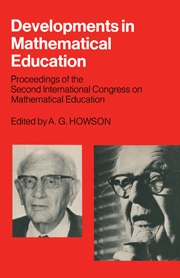 Developments in Mathematical Education
Developments in Mathematical Education from PART III - A SELECTION OF CONGRESS PAPERS
What do we mean by ‘Axiomatics’?
Modern mathematics, as it has developed during the last century and is still progressing, is characterised both by the axiomatic method and a tendency to abstractness. There are two types of mathematics constructed axiomatically, namely, categorical and non-categorical theories. Examples of the former are Euclidean geometry and the theory of the natural numbers, and of the latter, group, ring, field, vector space and metric space. Roughly speaking, the former is an axiomatisation of a substance – an entity – and the latter is an abstraction of a structure.
A categorical theory can be constructed in two different ways. One way is to discover the essential basis, look for the foundation of a theory, and axiomatise the theory. This is in the spirit of Euclid and Hilbert and may be called the historical development. Historical Euclidean geometry, Hilbert's rigorous theory and Peano's theory of the naturals are examples of this historical development.
The other way is as follows. First, we break down a theory into essential pieces, observe some similarity in different theories, and abstract a common structure. Thus we obtain a non-categorical theory. Next, we organise several non-categorical theories to characterise a categorical theory. This is in the spirit of modern mathematics and may be called the modern development. Thus, an approach in which the Euclidean plane is characterised as a two-dimensional linear space with an inner product typifies this development.
To save this book to your Kindle, first ensure [email protected] is added to your Approved Personal Document E-mail List under your Personal Document Settings on the Manage Your Content and Devices page of your Amazon account. Then enter the ‘name’ part of your Kindle email address below. Find out more about saving to your Kindle.
Note you can select to save to either the @free.kindle.com or @kindle.com variations. ‘@free.kindle.com’ emails are free but can only be saved to your device when it is connected to wi-fi. ‘@kindle.com’ emails can be delivered even when you are not connected to wi-fi, but note that service fees apply.
Find out more about the Kindle Personal Document Service.
To save content items to your account, please confirm that you agree to abide by our usage policies. If this is the first time you use this feature, you will be asked to authorise Cambridge Core to connect with your account. Find out more about saving content to Dropbox.
To save content items to your account, please confirm that you agree to abide by our usage policies. If this is the first time you use this feature, you will be asked to authorise Cambridge Core to connect with your account. Find out more about saving content to Google Drive.